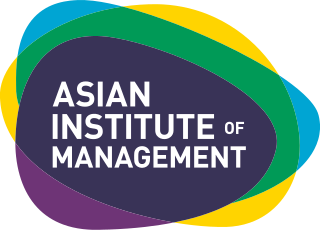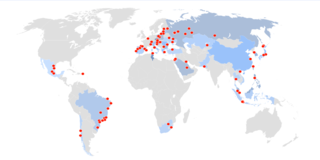Related Research Articles
Technology transfer (TT), also called transfer of technology (TOT), is the process of transferring (disseminating) technology from the person or organization that owns or holds it to another person or organization, in an attempt to transform inventions and scientific outcomes into new products and services that benefit society. Technology transfer is closely related to knowledge transfer.
A business incubator is an organization that helps startup companies and individual entrepreneurs to develop their businesses by providing a fullscale range of services, starting with management training and office space, and ending with venture capital financing. The National Business Incubation Association (NBIA) defines business incubators as a catalyst tool for either regional or national economic development. NBIA categorizes its members' incubators by the following five incubator types: academic institutions; non-profit development corporations; for-profit property development ventures; venture capital firms, and a combination of the above.

The Asian Institute of Management (AIM) is a management school and research institution in Makati, the Philippines. Established in partnership with Harvard Business School, it is one of the few business schools in Asia to be internationally accredited with the Association to Advance Collegiate Schools of Business (AACSB). Stephen H. Fuller of the Harvard Business School was its first president. It was described by Asiaweek magazine as the best in the Asia-Pacific region in terms of executive education.

The California Institute for Quantitative Biosciences (QB3) is a nonprofit research and technology commercialization institute affiliated with three University of California campuses in the San Francisco Bay Area: Berkeley, San Francisco, and Santa Cruz. QB3's domain is the quantitative biosciences: areas of biology in which advances are chiefly made by scientists applying techniques from physics, chemistry, engineering, and computer science.

The U.P.–Ayala Land TechnoHub is an information technology hub jointly developed by the University of the Philippines Diliman and property developer Ayala Land. It is located along Commonwealth Avenue in U.P. Campus, Quezon City, Metro Manila. and occupies 20 ha (0.20 km2) of the 37.5 ha (0.375 km2) U.P. North Science and Technology Park inside the U.P. Diliman campus.

The Centre for Cellular and Molecular Platforms (C-CAMP) is an initiative of the Department of Biotechnology, Ministry of Science, Technology and Earth Sciences, Govt. of India. Established in 2009 with a mandate to enable cutting edge Life Sciences Research and Innovation, C-CAMP is the country's most exciting life sciences innovation hub bringing together academia, industry and the startup ecosystem - all on one platform. It is also a part of one of the country's earliest bio-clusters, the Bangalore Bio-Cluster.

Microsoft Innovation Centers (MICs) are local government organizations, universities, industry organizations, or software or hardware vendors who partner with Microsoft with a common goal to foster the growth of local software economies. These are state of the art technology facilities which are open to students, developers, IT professionals, entrepreneurs, startups and academic researchers. While each Center tunes its programs to local needs, they all provide similar content and services designed to accelerate technology advances and stimulate local software economies through skills and professional training, industry partnerships and innovation. As of 10 September 2010, there are 115 Microsoft Innovation Centers worldwide, most of which are open to the public. Recently it was reported that Microsoft had proposed to build about 100 innovation centers in India, and several in China. Some innovation centers have also started to develop in Pakistan.
Startup accelerators, also known as seed accelerators, are fixed-term, cohort-based programs, that include mentorship and educational components, and (sometimes) culminate in a public pitch event or demo day. While traditional business incubators are often government-funded, generally take no equity, and rarely provide funding, accelerators can be either privately or publicly funded and cover a wide range of industries. Unlike business incubators, the application process for seed accelerators is open to anyone, but is highly competitive. There are specific accelerators, such as corporate accelerators, which are often subsidiaries or programs of larger corporations that act like seed accelerators.

The DMZ is Toronto Metropolitan University's business incubator for early-stage technology startups.

A startup ecosystem is formed by people in startups in their various stages, and various types of organizations in a location that are interacting as a system to create and scale new startup companies. These organizations can be further divided into categories such as universities, funding organizations, support organizations, research organizations, service provider organizations and large corporations. Local Governments and Government organizations such as Commerce / Industry / Economic Development departments also play an important role in a startup ecosystem. Different organizations typically focus on specific parts of the ecosystem function and startups at their specific development stage(s).
Innovation districts are urban geographies of innovation where R&D strong institutions, companies, and other private actors develop integrated strategies and solutions to develop thriving innovation ecosystems–areas that attract entrepreneurs, startups, and business incubators. Unlike science parks, innovation districts are physically compact, leverage density and high levels of accessibility, and provide a “mash up” of activities including housing, office, and neighborhood-serving amenities. Districts signify the collapse back of innovation into cities and is increasingly used as a way to revitalize the economies of cities and their broader regions. As of 2019, there are more than 100 districts worldwide.

Research Park at the University of Illinois Urbana-Champaign is a research park located in the southwest part of the University of Illinois Urbana-Champaign campus in Champaign, Illinois. Research Park is a technology hub for startup companies and corporate research and development operations. Within Research Park there are more than 120 companies employing more than 2,100 people including students and full-time technology professionals.

T-Hub is an innovation intermediary and business incubator based in Raidurg, Hyderabad, Telangana, India. Based on the triple helix model of innovation, it is a partnership between the Government of Telangana, three academic institutes in Hyderabad and the private sector.

Kerala Startup Mission (KSUM), formerly known as Technopark TBI, is a state-level agency under the Government of Kerala, India, dedicated to fostering entrepreneurship and incubation activities. Established primarily to manage the Technology Business Incubator (TBI), a startup accelerator, KSUM aims to cultivate a conducive environment for high-technology-based businesses.
1871 is a nonprofit digital startup incubator in the Merchandise Mart, Chicago, Illinois. It was founded in 2012 by J. B. Pritzker and is the flagship project of The Chicagoland Entrepreneurial Center (CEC), a nonprofit organization that helps entrepreneurs build high-growth, sustainable businesses that serve as platforms for economic development and civic leadership. Led by CEO Betsy Ziegler, 1871 has become a major hub of Chicago's technology and entrepreneurial ecosystem and hosts over 400 early-stage companies as well as nationally recognized accelerators, industry-specific incubators, and tech talent schools. In 2019, UBI Global recognized 1871 as the Top Private Business Incubator in the World and Most Promising Incubator for Women Founders.
Technology Hub is a bi-national startup accelerator and business incubator in the El Paso–Juárez area on the border of Mexico and the United States. It was founded in 2015 and is a Mexico National Institute for Entrepreneurship-certified incubator that has developed and housed 100 high-growth technology companies.
York Entrepreneurship Development Institute (YEDI) is a venture fund, startup accelerator, incubator and entrepreneurial community located within York University in Toronto, Ontario, Canada. YEDI facilitates collaboration between students, alumni, and academic and business leaders. The organization was founded in 2013 by businessman Dr. Marat Ressin, a native of Russia with close ties to the Jewish community in Canada.

The Ion District, Ion Innovation District, or Rice Innovation District, is a technology park and innovation district in Midtown Houston which was established as a joint initiative between Rice University and the City of Houston. It has also been called the South Main Innovation District. The district's central hub and first building is the Ion, which opened in 2021 after owner Rice Management Company (RMC) converted it from a former Sears store. The building houses coworking and office spaces, business incubators and accelerators, classrooms, a prototyping lab, investor studio, and restaurants. Current tenants include Chevron Technology Ventures, Microsoft, and Liongard. The district also includes Greentown Labs Houston, a business incubator focused on climate technology and sustainable energy, and a large outdoor plaza.

CIIE.CO is an Indian startup accelerator and incubator that supports early-stage startups located at IIM Ahmedabad in Ahmedabad, India. It was founded in 2002 to promote innovation and entrepreneurship in India. It is a Center of excellence set up at Indian Institute of Management Ahmedabad with support from the Government of India's Department of Science and Technology and the Government of Gujarat.
References
- ↑ "Technology Transfer Organizations". www.wipo.int. Retrieved 2022-05-05.
- ↑ "Technology Business Incubators". National Science and Technology Entrepreneurship Development Board. Department of Science and Technology, India. Retrieved 29 October 2018.
- ↑ "Technology Business Incubation Program". Philippine Council for Industry, Energy, and Emerging Technology Research and Development. Department of Science and Technology, Republic of the Philippines. Retrieved 29 October 2018.
- ↑ "Scale Team with Expert Developers". Havedevs. Retrieved 2024-10-02.
- ↑ "Examples of Business Incubators India" . Retrieved 12 October 2022.
- 1 2 3 "UK's Top 9 Startup Accelerators & Incubators [2022]". 15 July 2022.
- 1 2 3 "The 50 Best Startup Incubators & Accelerators in the USA (2022)" . Retrieved 12 October 2022.